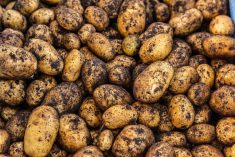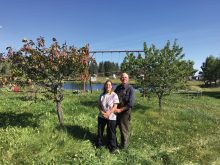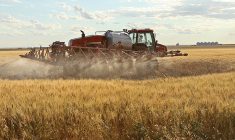Recent reports of pesticides found on organic produce will prompt buyers of organic food to pay more attention to its source, says the head of Manitoba Organic Alliance (MOA).
“I don’t see this as turning anyone off organics. I see this as a benefit to organics and to the buy-local movement,” said Kate Storey, a Grandview-area organic grower.
She was responding to a CBC report last week citing Canadian Food Inspection Agency findings that show nearly half of organic fresh fruit and vegetables sold in Canada and tested over the past two years contained pesticide residues. The report said most of the fresh produce sampled was imported, with only one-fifth grown in Canada. Of the domestic samples about 43 per cent tested positive for at least one pesticide — just slightly lower than imported samples (46 per cent).
Read Also

KAP flags risky trade for Manitoba farmers
Tariffs, market access uncertainty, trade diversification and export infrastructure top the agenda at Keystone Agricultural Producers (KAP) annual meeting.
The CFIA told CBC none of the test results posed a health risk and the agency did not prevent any of the food from being sold as organic.
Storey said this raises the issue of how standards for organic production around the world differ — and that organic consumers need to know there are different standards worldwide.
Ideally, there would be one worldwide standard for organic production but there is not, she said.
“A lot of the fruit and vegetables being sold here are coming from fairly polluted countries like China and Mexico,” she said, adding that Canadian producers not only grow in a cleaner environment but produce to a Canadian standard that’s also higher than standards for production elsewhere.
“It comes down to whether you trust the testing and standard of the country (of product origin),” she said.
Storey said any consumer who doesn’t know what they’re getting should start to source organic food as close to home as possible.
“Local can mean Canada, or Manitoba,” she said, adding that Manitoba is a leader in putting safeguards in place when its own Organic Agricultural Products Act (OAPA) became law in 2013. That made it the first province in the country to pass a provincial organic law that mirrors the federal Organic Products Regulations (OPR) which came into effect in June 2009. It means Manitoba uses the same standard as the OAPA and relies on the same system of federally accredited certification bodies to ensure that organic operators comply with organic standards.
No product can be sold labelled organic unless it comes from a certified grower or processor that is annually audited. Like the federal system, enforcement in Manitoba is complaint based.
The reports raising questions about pesticides on organic food should make buyers more informed about the work done in Canada to raise the bar for production, Storey said.
“I think this is going to make the organic consumer be checking labels and asking questions and turning to locally grown organic food.”















